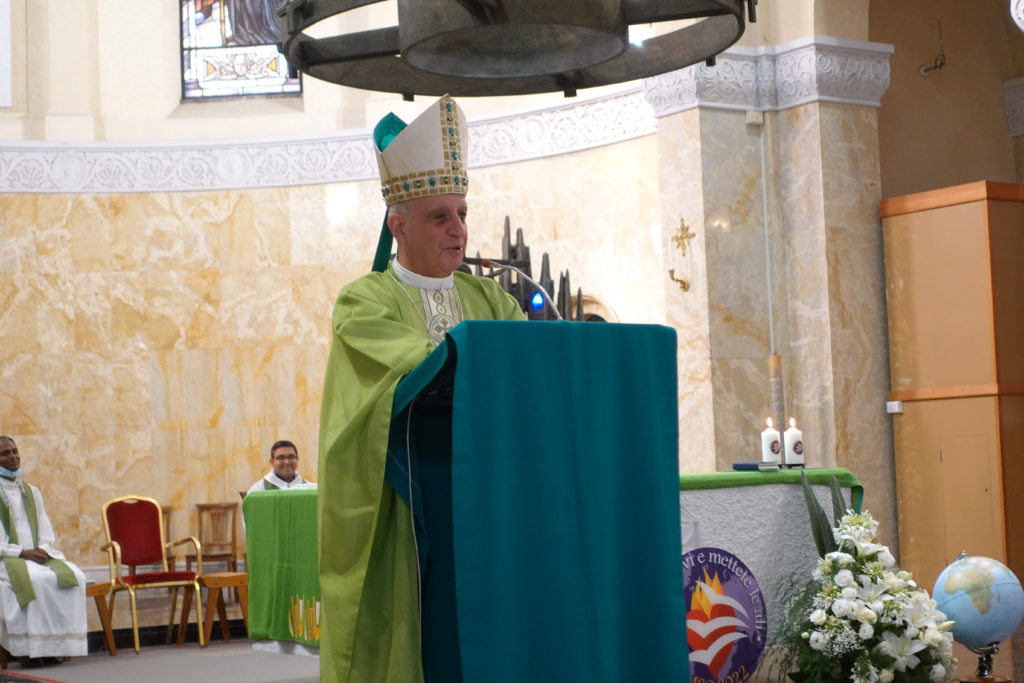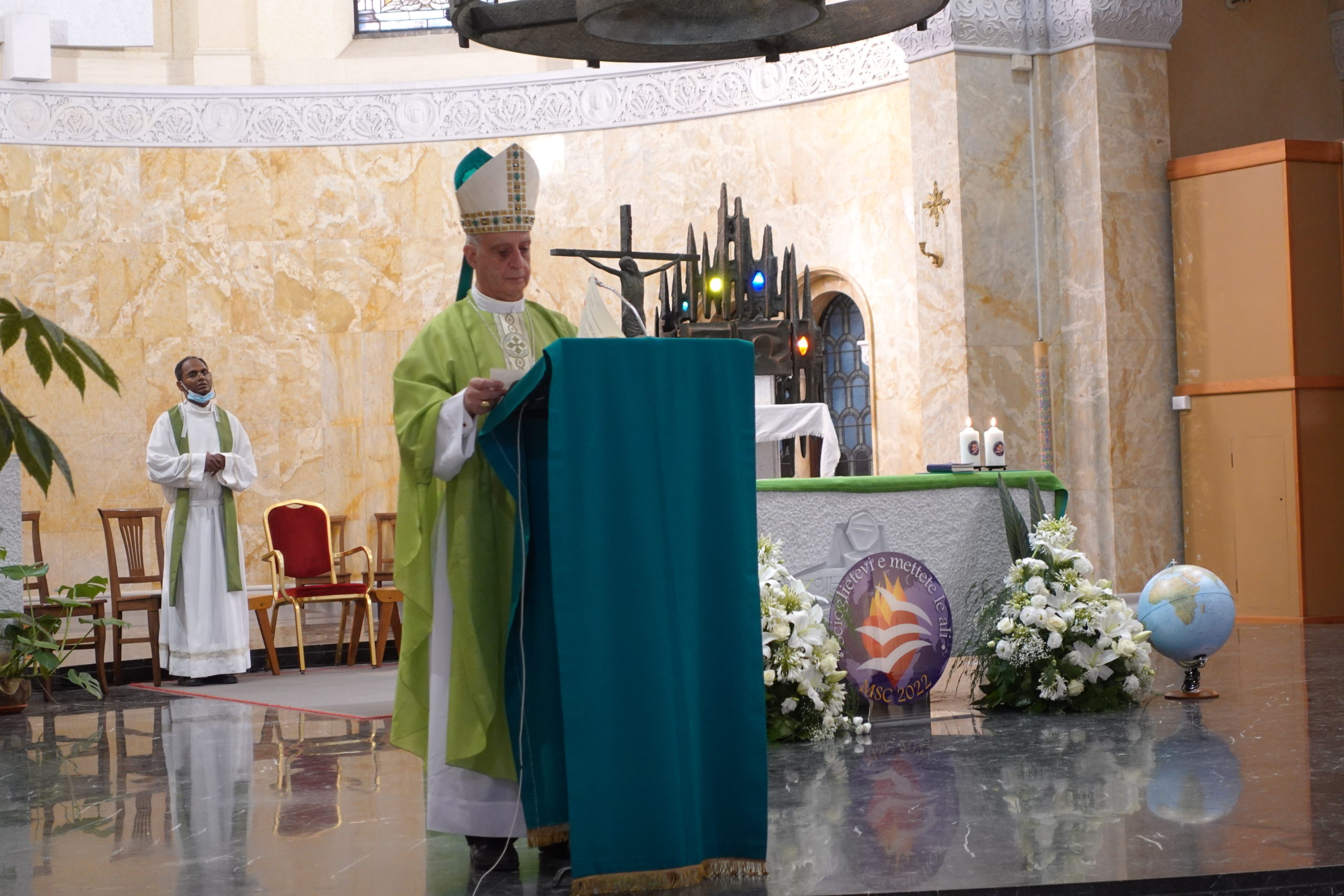We share here Bishop Rino Fisichella’s homily given at the opening ceremony of the 16th General Chapter on June 26. Enjoy reading!
Msgr. Salvatore “Rino” Fisichella is President Emeritus of the Pontifical Council for the Promotion of the New Evangelization.
Dear sisters and brothers, the Word of God that we have heard comes profoundly to aid the work that you are beginning today. We have read the conclusion of Chapter 9 of Luke’s Gospel, and in order to fully understand the word of Jesus that we have heard, it is necessary that we place it within the whole context of Chapter 9. At the beginning of this chapter, Jesus sends his disciples to preach the gospel, to proclaim the gospel. The chapter begins with this important task, proclaim the Gospel, and to proclaim the Gospel Jesus gives power to the disciples to cast out demons and to heal diseases; and the disciples go, they proclaim in the villages and they experience, they touch that they can cast out demons and heal diseases; then they return to Jesus, they are happy because they have fulfilled the mission that Jesus has given them and Jesus calls them to stand apart in a deserted place: Jesus alone with his disciples; but people follow and people find Jesus and so many of these people brought nothing and Jesus then from few loaves and few fishes performs the famous gesture of the multiplication of the loaves and fishes and everyone ate, 5,000 people ate of little bread and two three fishes and then a man comes and he cries out to Jesus, he calls out to him: “Jesus heal my son, your disciples tried to heal him but they couldn’t,” and Jesus saying, “People of little faith if you don’t see the miracles, you don’t believe.” These kind of spirits need penance and prayer to be cast out and Jesus delivered this boy from the unclean spirit and then he asks his disciples but who do you say that I am and Peter makes the profession of faith you are the Christ, you are the son of God. At this point, you see, within the passage that we have heard, Jesus again sends his disciples out to proclaim the gospel and here at this point there are some particular gestures, some particularities that are good to understand. Jesus made the firm decision to set out for Jerusalem, not just any decision he made the firm, the determined decision to go to Jerusalem. What does this phrase mean? Jesus is firmly determined to fulfill the will of his father. Jerusalem is the place where the will of the father is fulfilled, where Jesus gives his whole self on the cross. We are coming back from the solemnity of the Sacred Heart of Jesus, that heart says that Jesus gives all of himself, the love of God is contained in this particular sign, the heart; however, it is not received by the Samaritans.
Dear sisters, dear brothers there is always some one who rejects the proclamation of the Gospel, we should not be surprised. The proclamation must be made to everyone, then there is the freedom that God has given to each one of us; you see the whole context that I have told you about represents these upcoming days of your work.
Mother Cabrini wanted you so that you would proclaim the Gospel. Mother Cabrini wanted her daughters so that they would be missionaries, evangelizers is the same thing. Before anything else she asked you to proclaim the Gospel, the Word of God. This is not only the task of every baptized person, this Mother Cabrini wanted it specifically for you, you know the history better than me however I know a little bit of the history too and until that time it was men who went to be missionaries, not women. Mother Cabrini, listening to the spirit speaking through her, deeply understood her life as a missionary; China and then not to the East but to the West but always a missionary. You cannot fail in this charism that belongs to you, women evangelizers with all that this entails, with the strength, the novelty, the typical sensitivity of women in proclaiming the Gospel, in being together with Jesus, in overcoming limitations, in healing illnesses. Mother Cabrini began to give the concrete signs of evangelization with education and with hospitals, with one and the other she put into practice what we have heard: cast out demons, the devil of ignorance, heal the sick. The proclamation becomes visible through the concrete sign, not just the words the Word is inevitably united with the sign and the sign explains the Word, makes you understand, gives intelligence to the Word and here you see Jesus calls his disciples to a place in the background. It is these days when you are estranged from your daily work to plan the coming years, let it be a work lived together with Jesus, in communion of life with him, seeking first of all to listen, first of all to listen to God when he speaks because God speaks but he requires listening and to listen we must be silent. Live these days with great moment of silence to listen to God, and, if you listen to God, you also listen to your sisters. Let these days be a time of listening to each other. You have brought to the altar the rule and flags indicating the world and the world indicates diversity, indicates different cultures, indicates the way of reasoning and seeing things that are different not opposite, complementary. Listening helps us to have a complementary view of one another so that we can then propose a global view, and here we come to the last point. We listened, there are three different situations that presented themselves to Jesus as they were walking, we Christians are not stationary, we are always on the way, we have to reach out to the world as they were walking one said to him, “I will follow you,” there was availability, he is not called and he who hears “I will follow you” and Jesus begins to put a first condition: poverty. The son of man has nothing, he doesn’t even have a stone to lay his head on. If we want to follow the lord the first condition asked of us is to recognize our poverty, our limitations, our contradictions; only together do we form wealth, only together. Alone we are too weak, the proclamation of the Gospel finds its strength because there is a people who proclaim it, because there is a community that lives by that Gospel; then there is a second situation: here it is Jesus who calls “Follow me!”, we are not told to whom “Follow me! ” and this asks the lord let me go first to bury my father i.e. let me fulfill my duties before the law because the law Deuteronomy obligated to burial, obligated children to care according to the commandment “Honor your father and mother” and what does Jesus answer him? Here is the second thing: freedom, freedom from the law is what Paul reminded us in the second reading, in the letter to the Galatians: the children of God live a new life and it is the life of freedom. We have overcome the law, the law Paul says is propaedeutic. When there is the Lord to follow there is no law that holds, neither of the State nor of the Church you follow, you follow; when it is the spirit that calls you follow. You can imagine Mother Cabrini if she had to listen to the priests what the law of the Church told them and Scalabrini wanted other things from Mother Cabrini. Mother Cabrini’s freedom of wanting to be not independent, autonomous but free according to the Gospel. Be free according to the Gospel; this is the real revolution that can be accomplished in the Church and in the world and then there was the last one. Another one said to him, “Lord I will follow you but first let me go and greet those in my house and here we heard it also in the first reading and Elisha asks Elijah: Let me go and greet,” in itself it is not so much to greet because the original text says “Let me go and give a kiss, a kiss to my father and my mother then I will follow you.” What a beautiful image “Let me go and kiss my dad and my mom.” It is a call to the affections and yet when Jesus calls, Jesus is not Elijah: here the radicality is much deeper. When he calls, one must leave everything and everyone to be solely and exclusively at the service of the child of God. Dear sisters, there is no neutrality before the Lord. When one truly encounters Christ there is no more neutrality, there is no indifference, there cannot be. There is only and exclusively the way of following, and then we listen to Mother Cabrini. There are you see some very beautiful verbs that Mother Cabrini uses in her letters, especially she says, “Dive into God,” dive into God that is, throw yourself in; dive means to throw yourself into the water. Dive into God, dive into grace I don’t know if I was struck by these phrases because there is a lot of heat and so one was thinking of diving into the sea no so everything becomes… I don’t know if that’s why… however how beautiful to dive into God; let these days be a diving, a plunging into the life of grace and then trust against all hope and you will never be confused. Always be attached to hope; hope is not just the future. Hope means living the present to prepare for the future, living with the certainty that the future will truly be immersed by God’s grace. Here dear sisters I have taken some time but I wanted on this word of the Lord to leave you a simple but challenging message that Mother Cabrini help us and help you with her presence to carry it forward and so be it.


